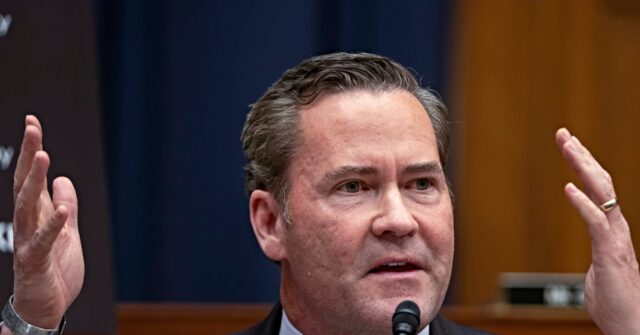Florida Republican Rep. Mike Waltz has raised significant concerns regarding the potential for increased nuclear conflict under a prospective Harris-Walz administration, suggesting that a continued “appeasement” strategy toward Iran could pose a severe threat to national and global security. In a recent interview, Waltz, who is a member of the Armed Services Committee and a former Green Beret, expressed fears that the current administration has been infiltrated by Iranian sympathizers, which he believes is undermining U.S. foreign policy. He specifically cited key figures within the Biden administration, like Rob Malley and Kamala Harris’s national security adviser Philip Gordon, as influences whose pro-Iranian positions have persisted for over a decade, potentially leading to disastrous implications for U.S. interests abroad and regional stability.
Waltz contended that the ties held by these individuals to Iran have contributed to the empowerment of the country, allowing it to increase its regional aggression against allies like Israel. He argued that these officials operate under the misguided belief that if the U.S. concedes enough to Iran, it can be turned into a stabilizing force in the Middle East, rather than recognizing it as a source of instability. This perspective, according to Waltz, leads to a dangerous paradigm wherein Israel is viewed as the real threat in the region while Iran is oversimplified as a victim deserving of appeasement.
He also criticized former Secretary of State John Kerry for his reported communications with Iranian officials during the Trump administration, suggesting that Kerry’s advice to “hold the course” until a change in U.S. leadership could have detrimental effects on U.S. efforts to isolate Iran. Waltz emphasized that under a renewed term of appeasement toward Iran, as many fear could happen in a new Harris administration, the specter of a nuclear arms race in the Middle East would become increasingly probable, fundamentally altering the balance of power and increasing risks for American citizens.
The former policies under the Trump administration, which aimed for maximum economic pressure against Iran and a withdrawal from the 2015 Iran nuclear deal, are contrasted sharply against the current administration’s more lenient approach. Waltz highlighted that the Iran deal, although designed to curb Iran’s nuclear ambitions in exchange for sanctions relief, ultimately allowed Tehran to expand its influence and support for terrorism across the region. This policy shift, he argued, has led to a deteriorating situation where Iran is perceived to have grown more assertive as a regional power due to the absence of strong opposition.
Amid ongoing investigations, including those regarding leaks of classified information concerning Israel’s plans against Iran, Waltz continued to call out the current administration’s alleged weaknesses as contributing to increased threats from adversaries. His advocacy for a firmer stance toward Iran is also framed within a broader narrative that emphasizes the dangers of perceived U.S. weakness internationally. He considered the administration’s recent policies as contributing factors to a volatile global climate, which ought to concern everyday Americans who generally focus on domestic issues.
Ultimately, Waltz’s warnings portray a stark view of U.S. foreign policy’s trajectory under the current administration. His criticisms not only reflect concerns for national security but also urge a reevaluation of how the U.S. engages with hostile states like Iran. As the possibility of renewed conflict looms, he asserts that a decisive change in strategy is required to deter threats and uphold U.S. interests abroad, while protecting the integrity and safety of the American populace.

